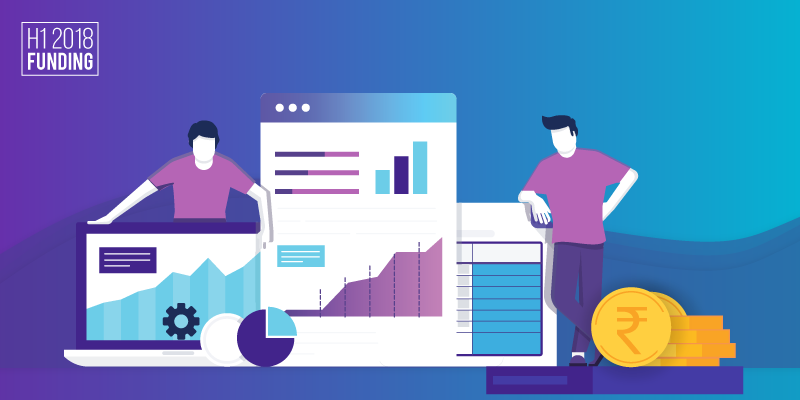Funding momentum slows in H1 2018, but there’s no shortage of capital
There may have been a decline in the quantum of VC investments during the first half of 2018 but there’s no reason to worry as the funding environment hasn’t changed dramatically, analysts say.
The funding environment in the first half of 2018 proved somewhat tepid, with the overall investment and number of deals dropping compared with the same period last year, according to data gathered by YourStory Research.
Overall venture funding in H1 2018 stood at $6.1 billion, a 10.5 percent drop versus $6.8 billion in H1 2017. However, the number of deals increased marginally to 465 in the six months ended June 30, 2018, versus 449 in the same period last year.
These numbers include PE deals and debt financing. Excluding debt finance, H1 2018 finished with $5.03 billion in funding compared with $6.18 billion in H1 2017.
Last year, the first six months were characterized by massive funding rounds snapped up by the likes of Flipkart, Ola and Paytm; in some cases, the highest in their history. It also marked the deepening commitment of global marquee names such as Tencent, Microsoft and Alibaba to the Indian startup ecosystem. The big news this year, of course, was Flipkart’s acquisition by Walmart for $16 billion.

Holding momentum despite a dip
V Balakrishnan of Exfinity Ventures believes that overall, the funding environment has remained steady. “Look at the funding environment. Two or three large fundings skew the data, but if you don’t consider the large deals, the rest of the funding environment has not changed dramatically,” he says.
Harish HV, a Bengaluru-based management consultant, adds, “The investment cycles are getting a little longer and VCs at this stage are in a good position because they have seen some good exits.” He also feels that there has been no big push in terms of reforms after the startup policy announcement and many of the regulatory changes have led people to wait and watch for the new structure.
Fintech on top
In terms of sector-wise funding, Fintech remained in favour, garnering the largest quantum of risk capital - $1.02 billion - in H1 2018, with PolicyBazaar accounting for the biggest chunk, in excess of $200 million, which helped it move into the ‘unicorn’ club. The shot in the arm came from Softbank which joined the startup’s list of investors in its Series X round. Other notable investments in this segment were PineLabs, which received $125 million of private equity (PE) investment and Janalakshmi, which raised $100 million, also in PE funding.
Close on the heels of Fintech was ecommerce, which raised $951.27 million in H1 2018. This was largely boosted by the $450 million investment into Paytm Mall and the $300 million received by BigBasket.
Rutvik Doshi, Managing Director, Inventus Capital Partners, says the pure vanilla e-commerce players will not find too many takers and only specialized entities will see investments. According to him, Fintech, where things seem to be falling in place nicely, is still nascent so the opportunity is large in infrastructure areas such as payment, credit score and banking.
Foodtech, which was in the spotlight due to companies such as Swiggy and Zomato, received funding of $591.5 million in the first half of 2018. Hyperlocal, too, seems to be back in the game, with the number of deals and the funding climbing significantly over H1 2017.
Other segments that received notable funding were Clean Tech ($243.24 million) and Healthcare/healthtech ($318.4 million). Sectors that received over $100 million in funding during the first half of 2018 included artificial intelligence, logistics, and SaaS.
Manish Singhal of of Pi Ventures too believes there has been no significant change in funding. “The environment is shifting towards B2B startups, which require fewer rounds. The amount may have decreased but the deal volume remains the same,” he says.

Plenty of Vitamin D to go around
H1 2018 has had plenty of Series D deals, with a record 13 deals mopping up $538.4 million. Artificial Intelligence startup ThoughtSpot raising $145 million, followed by Avi Networks $60 million. Series C was close behind, wrapping up $502.5 million.
Ecommerce player Fynd raised the biggest round with $70 million. Series F rounds closed $466.1 million with and Swiggy ($100 million) accounting for a large chunk.
The funding momentum has therefore come with a reality check. “Entrepreneurs and VCs have become more sensible on who/what they invest in. Investors have also learnt what does not work,” Harish says.
To an extent, this is reflected is the slowdown in Series A and Series B rounds. Balakrishnan says, “There has been a slowdown in Series A and B as a lot more money is coming in angel and seed stages.” Pre-Series A had the highest number - 182 - for the first half of 2018, followed by Series A (39) and Series B (31). This does not compare favourably with H1 2017, which witnessed pre-Series A (241), Series A (60) and Series B (35).
Adds Rutvik, “I do not see shortage of quality startups on the ground. Of course, the quantity has reduced but the quality and investment opportunities has gone up.”
Further, VC firms continue to raise new, India-centric funds. Lightspeed Ventures, for instance, raised it second India-specific fund of $175 million just this week. Earlier, in April, Saama Capital completed raising its fourth India fund of $100 million. In March, IDG Ventures India brought on board the ventures arm of tech heavyweight Cisco as a limited partner.

Debt finance update
The debt financing route threw up some interesting numbers. In the first half of 2017, debt financing stood at $631.65 million; this went up to $1.15 billion in the first half of 2018. Around $853.15 million was raised across 20 deals with the largest sums raised by ReNew Power at $506 million, followed by Azure Power ($135 million). Others who also raised money through this route included Advanced Enzymes, Curefit, Power2SME, Ad2Pro, and MedPlus among others.
Entrepreneurs tend to pick the debt financing route when they think that valuation is a challenge; they raise debt to grow the business rather than go for equity.
However, Balakrishnan is against this. “Venture capital-backed companies should not raise debt; they should go for equity. One already has a business risk; you do not add a financial risk.”
But despite the dip in the overall funding momentum, there seems to be no reason to worry as a growing number of venture capital houses have raised fresh funds.
Manish believes that with most VCs and PE players raising funds, lack of money is not the reason for the temporary dip in investments.
“There is vibrancy in the entrepreneurial ecosystem. There is enough money available and ideas are also coming up. One could see some catchup in the second half,” Balakrishnan says.











